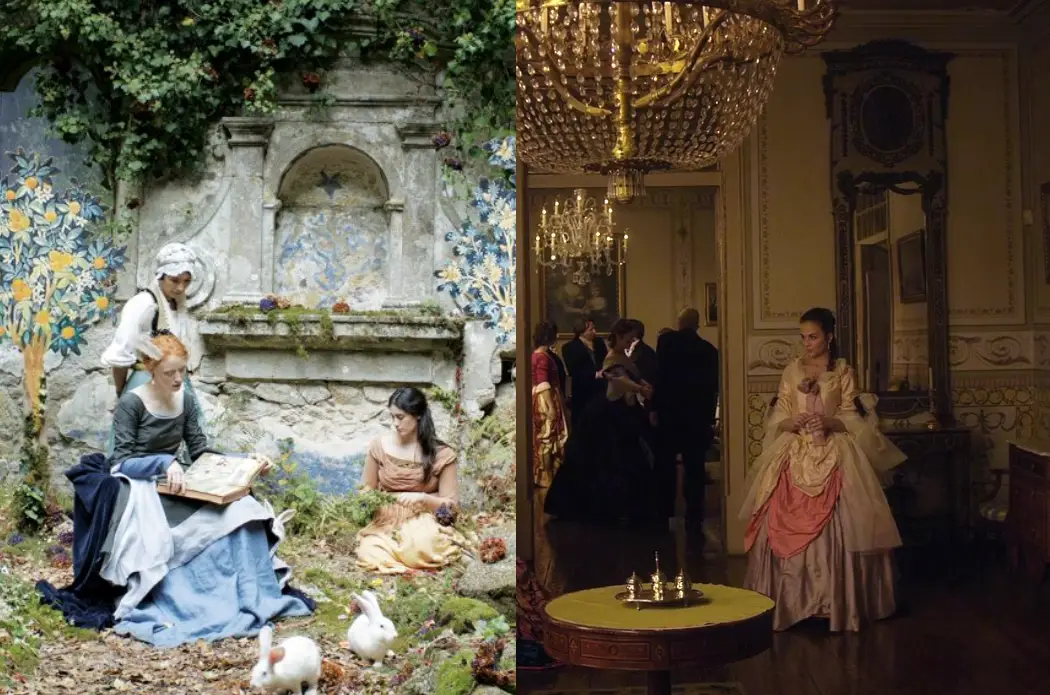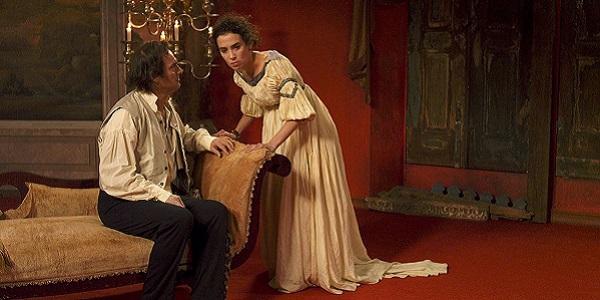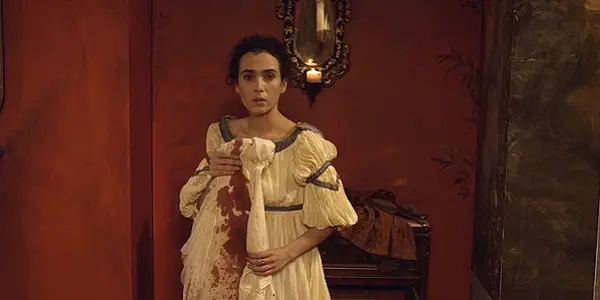This Woman’s Work: Two Modern Masterpieces from Rita Azevedo Gomes

Lee Jutton has directed short films starring a killer toaster,…
The work of Portuguese director Rita Azevedo Gomes is greatly underseen in the United States, yet as soon as you watch one of her films you cannot fathom why we’ve allowed ourselves to neglect her movies for so long. Never fear: MUBI is currently hosting a mini-retrospective highlighting four of her features, including the acclaimed dramas A Woman’s Revenge (2012) and The Portuguese Woman (2018).
That the retrospective has been dubbed Out of This World: The Cinema of Rita Azevedo Gomes could not be more fitting. From her use of theatrical constructs such as extensive monologues and painted backdrops to her experimental use of time and chronology, Azevedo Gomes’ strikingly unique films can often feel as though they are from another planet. However, the stories she chooses to tell are entirely grounded in the history of being a woman on Earth, and the complex struggles that have plagued our existence since time immemorial.
A Woman’s Revenge
A Woman’s Revenge was not Azevedo Gomes’ first feature, but it served as her international breakthrough on the festival circuit in 2012. An adaptation of one of the stories from 19th-century French author Jules-Amédée Barbey d’Aurevilly‘s acclaimed collection Les Diaboliques (The She-Devils), it tells the story of a wealthy noblewoman who gets revenge on her husband – one of the most powerful nobles in Spain – by becoming a prostitute.
Azevedo Gomes begins her film by introducing us not to the noblewoman in question, but to a dandy named Roberto (Fernando Rodrigues) who has grown increasingly bored with the base delights of his everyday life, swanning from one salon to the next in search of good conversation and romantic intrigue. One evening, a prostitute of unusual regal countenance catches his attention. Upon going back with her to her abode, Roberto is gifted with her story, told largely by the woman herself in long stretches of monologue as well as a few scattered flashbacks.

The woman in question (the phenomenal Rita Durão) is a duchess who fled her privileged life in Spain after her jealous husband brutally murdered his cousin – her lover – in front of her. As revenge upon his good name, which belongs to one of the oldest and most respected lineages in Spain, she left him for a life as a common prostitute. By freely giving herself to a variety of different men night after night, she has her revenge on her husband, who had refused to let any other man have her.
As noted, most of the story is relayed by the duchess to Roberto through her telling it to him in her boudoir, as opposed to flashbacks reenacting it, giving the film a decidedly theatrical feel; one can easily imagine her telling her story onstage to a live audience. In contrast, the flashbacks themselves are designed to resemble historical tableaux, with very little dialogue and long moments of stillness, as though the actors are posing for paintings during those moments. That one is watching not only a play but a play-within-a-play is further emphasized by the film’s use of a narrator who also appears to be a stagehand; he periodically enters the narrative to describe the current happenings and Roberto’s thoughts on them to the audience.

It might seem odd to describe a film as telling rather than showing as a good thing, but when that film’s story is being told by Durão, fueled by the anger still simmering within her chest despite the time that has passed…well, bring on the telling. Her performance is magnificent, a touchstone of female rage and revenge in a world dominated by men. That the duchess finds her self-determination through sex work – and absolutely, unapologetically so – only adds to the admiration one has for her throughout the film. Indeed, in the end, Roberto grows to respect the duchess, which is more than can be said of how he feels about any of the “unsullied” ladies in his milieu.
Despite the purposely staged quality of the production – or perhaps because of it – A Woman’s Revenge is full of life. Powered by the battered yet still-beating heart that is Durão’s performance, the film comments on the way women are perceived by men both then and now: as objects on a pedestal to be used and then put back at one’s leisure, without any thought for what they truly want.
The Portuguese Woman
A fitting bookend to A Woman’s Revenge, Azevedo Gomes’ most recent narrative feature is another historical drama focused on an unusual female protagonist and her marriage. The Portuguese Woman tells the story of the titular character (Clara Riedenstein), a young woman who must abandon the sun-drenched Portuguese seaside of her childhood home for a cold, crumbling castle in the Northern Italian mountains. This is the ancestral home of her new husband, Lord Von Ketten (Marcello Urgeghe), a nobleman who is constantly at odds with the Bishop of Trent. Eventually, this leads to war, with the couple’s wedded bliss interrupted for an alarming eleven years while Von Ketten is away fighting.
Left alone in the castle, which is so run down it borders on inhospitable, the Portuguese woman must create a new life for herself. She adopts a wolf cub and raises it as a dog, rides horses in the forest, and embarks on creative pursuits such as art and music. Eventually, she finds great happiness in this solitude, despite the local gossip claiming that she is a heretic and a witch due to her foreign blood and independent lifestyle. However, when her husband finally returns from war, the couple must try to pick up where they left off so long ago, despite being almost entirely different people than they were when Von Ketten first left.

Again Azevedo Gomes boldly makes use of narrative devices that traditionally belong more to the theatrical tradition than the cinematic. Whereas A Woman’s Revenge had our omniscient narrator relaying Roberto’s experiences, The Portuguese Woman has German chanteuse and Fassbinder muse Ingrid Caven acting as a one-woman Greek chorus of sorts. Clad in black and floating around the castle ground in an almost ghostly fashion, Caven’s haunting singing provides an emotionally evocative soundtrack to the film as well as a shrewd commentary on the events taking place on the screen.
The story of The Portuguese Woman is not entirely chronological; it subtly jumps back and forth in time to highlight key moments such as the titular character contemplating what her future marriage might be like, Von Ketten’s awkward detente with the Bishop of Trent, who warns him that peace is more dangerous than war, and a sweet scene between the newlyweds as they bathe in barrels with a screen separating them, coyly flirting across the barrier when their servants aren’t looking. Many long, slow scenes seemingly play out in real-time, in a style reminiscent of Chantal Akerman. It is not always immediately apparent that a scene in The Portuguese Woman is a flashback, yet one does not need precise knowledge of the order in which the events of the film are taking place to understand the emotional arc of the story.

The titular character, as played by the striking Riedenstein, is a fiery wisp of a woman whose elegant beauty masks an inner resolve. She will not allow her husband’s lengthy absence to make her feel lonely or unwelcome in her own home, nor will she allow his sudden return, however welcome it may be, to drastically alter the life she has built for herself without him. Von Ketten’s sullen attitude upon his return from war – angst-ridden over an injury that has deprived him of his former strength, haunted by the Bishop of Trent’s words about the empty horrors of peacetime, when warriors find themselves without a purpose for the first time – leads him to behave in ways that frustrate and anger his wife. But whereas the naïve young bride he first brought home might have tolerated his toxic masculinity, the woman she has grown into has no patience for it. Using her feminine wiles to assert her dominance in ways that reminded me of the romantic battles in Paul Thomas Anderson’s Phantom Thread, the Portuguese woman is determined to be the victor in her own war.
Beautifully photographed by Acácio de Almeida, who also shot A Woman’s Revenge, The Portuguese Woman also gives one the impression that one is watching a series of moving paintings on the wall of an art gallery, chronicling the past. Yet like that of the protagonist of A Woman’s Revenge, the struggle of the heroine at the center The Portuguese Woman to assert herself does not feel consigned to history. Through her impeccably crafted historical dramas, Azevedo Gomes forces us to come face-to-face with the realization that certain forms of oppression are still alive and well.
Conclusion
There is much debate over the term auteur – whether it is out-of-date, whether it is applied too frequently to filmmakers, and especially to male ones at that – but in watching her work, there is no denying that Rita Azevedo Gomes deserves this appellation more than most of her contemporaries in modern cinema. Her highly stylized yet deeply empathetic films serve as yet another reminder of why it is so important to have women filmmakers telling women’s stories.
What do you think? Are you familiar with the cinema of Rita Azevedo Gomes? Share your thoughts in the comments below.
A Woman’s Revenge and The Portuguese Woman are currently available for streaming on MUBI.
Does content like this matter to you?
Become a Member and support film journalism. Unlock access to all of Film Inquiry`s great articles. Join a community of like-minded readers who are passionate about cinema - get access to our private members Network, give back to independent filmmakers, and more.
Lee Jutton has directed short films starring a killer toaster, a killer Christmas tree, and a not-killer leopard. Her writing has appeared in publications such as Film School Rejects, Bitch: A Feminist Response to Pop Culture, Bitch Flicks, TV Fanatic, and Just Press Play. When not watching, making, or writing about films, she can usually be found on Twitter obsessing over soccer, BTS, and her cat.













